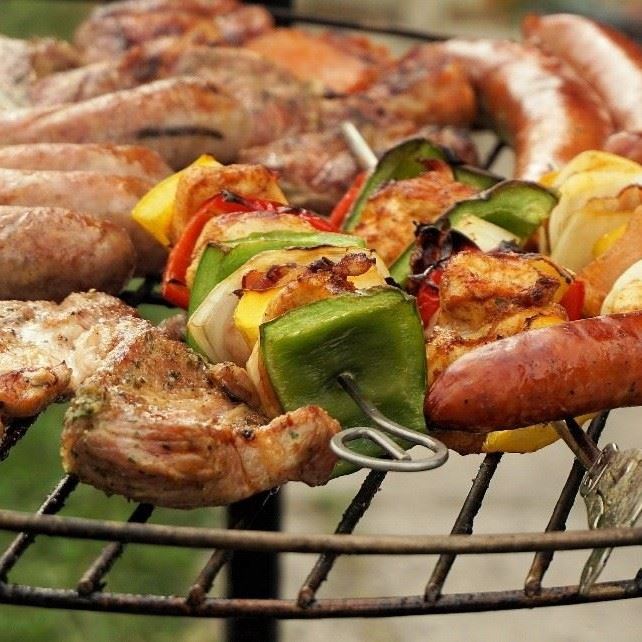Increased time outside in the summer can lead to bites and stings from all types of creatures. Visit the bites and stings page here for information on treating bee stings, and preventing bites from snakes and mosquitoes.
- Home
- Prevention
- Seasonal Poisoning Hazards
SEASONAL POISONING HAZARDS
|
|
Lamp oil, lighter fluid, and tiki-style torch fuels are hydrocarbons: slick substances that can cause “chemical pneumonia” if even a few drops get into someone’s airway, especially a child’s. These oils are often pleasantly scented and/or colored. They can resemble or are sometimes stored in containers resembling beverages.
Always keep these products in their original container and locked up away from children.
If someone swallows or inhales any amount of lamp oil, tiki-style torch oil, or lighter fluid, do NOT induce vomiting as this can make the problem worse.
For many adults, alcohol is safe when enjoyed in moderation. However, alcohol is known to interact with many prescription and over-the-counter medicines. Make sure that consuming alcohol is safe for you given any medicines you may be taking. Finally, hot summer days cause fluid loss through sweating, while alcohol causes fluid loss through increased urination. Spending time in hot weather while drinking alcohol can quickly lead to dehydration or heat stroke.
Alcohol is very dangerous for children. When it comes to alcohol, children are not little adults! Even a small amount of alcohol can have harmful effects on a child. Children are naturally curious and mimic adult behaviors, so take special care to keep the wine, beer, liquor, and mixed drinks that you enjoy in moderation up and away from children. If you suspect a child has ingested any amount of alcohol, call the Poison Help line right away at 1-800-222-1222.
No matter when you’re cooking, it’s always important to practice food safety , however outdoor gatherings and cookouts require extra care to prevent foodborne illness.
Keep cold salads cold. Place cold salads, like potato salad, in a cooler until ready to eat. Place serving dishes on ice or cool packs to make sure these dishes stay at 40F. Plan ahead for your picnic. If you won’t have access to running water, plan to bring a water jug, soap, and paper towels. Pack plenty of serving and preparation dishes.
Marinate safely. Only marinate foods in the refrigerator, and don’t reuse marinade. The most common symptoms of food poisoning include upset stomach, abdominal cramps, nausea and vomiting, diarrhea, fever, and dehydration. Symptoms may range from mild to severe and differ depending on the causative agent.
Review more food safety tips for picnics and grilling from the FDA.
Did you know that fireworks are poisonous? Exposures to fireworks are not very common, but fireworks contain a number of toxic chemicals that can be very dangerous if swallowed. Keep fireworks away from children and pets. If a person or pet ingests part or all of a firework (including “snake”-type fireworks), call Poison Help at 1-800-222-1222 immediately.
Exposures to glow products, like glow sticks, are also common around the 4th of July.
Exposures to pesticide products are reported most commonly in the summer months. If you choose to use chemicals to address problem pests in your lawn and garden, like slugs, rodents, or weeds, check out these safety tips.
Before you apply• Read the label. Double check that the product targets the insect, rodent, or weed you want to control.
• Put on long pants, socks and shoes, long sleeves, and rubber gloves. The label may suggest additional protection like goggles or glasses.
• Remove toys and pet dishes from the yard.
• Keep kids and pets inside or away from the yard.
• Wait for good weather. Wind and rain can cause products to blow away or run off.
After you apply• Do not allow kids or pets back in the yard until the product has fully dried or dust settles.
• Check that all lids are closed and tightly sealed.
• Keep the product in its original packaging. Never transfer pesticides to empty food or drink containers.
• Store up, away, and out of sight of children and pets.
• Take off the clothing you wore during application, and wash your hands.
• Follow disposal directions on the label.
If someone swallows or inhales a pesticide, or gets a pesticide in the eyes or on the skin, call the Poison Help line at 1-800-222-1222. For general questions about the risks, of using or how to select, store, or use insect repellents and other pesticides, call the National Pesticide Information Center at 1-800-858-7378 or visit NPIC’s website.
/APC%20logo_2C%20with%20tagline.jpg)
 Summer Poison Safety
Summer Poison Safety